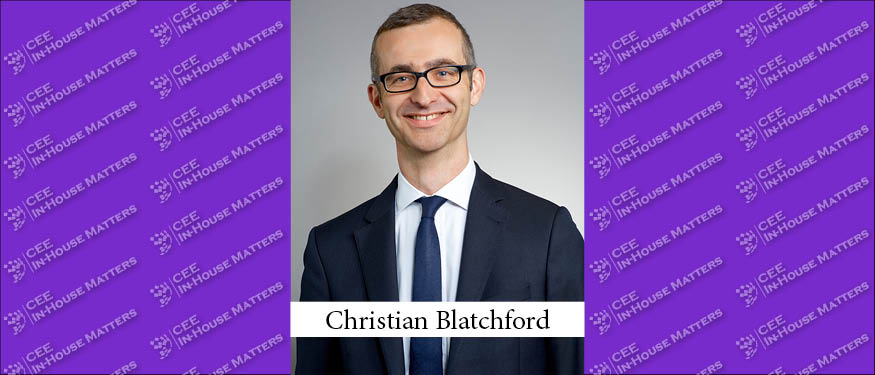Christian Blatchford, General Counsel at Energo-Pro, explains how he goes about selecting external advisors – and what he wishes private practice lawyers would do differently.
CEEIHM: To give our readers some context, tell us a few words about your career leading up to your current role with Energo-Pro.
Christian: I started out in the City of London with the US law firm Altheimer & Gray. The firm was originally from Chicago but expanded globally in the 90s. The positive news of qualifying as a lawyer came a couple of weeks before the negative one that the firm was going bust. I quickly jumped ship to Cameron McKenna, which was a great experience and involved a fateful secondment to Prague. At the end of this, I was politely asked to return to London and, equally politely, declined and moved to Kocian Solc Balastik. I ended up spending 12 years there – which were my most formative as a lawyer. While at KSB, I began working with Energo-Pro, initially on an M&A transaction in 2015, and then on some financing and DCM matters. Eventually, it made sense to both sides for me to join the group.
CEEIHM: You moved into your first in-house role about a year and a half ago. What has been the most interesting part for you in making the switch from private practice?
Christian: Making the transition from private practice to in-house has involved the usual clichés of getting close to the business and working with non-lawyers (how they hate that term!). It’s a cliché because it’s true. I got to understand how our markets work and how we operate on them, which is something lawyers often say they do but don’t. Working with finance and technical people is great, although in the initial few months I felt rather lost.
Overall, I have experienced a broadening of the scope of work that I do, even when it comes to purely legal matters. I now need to understand and manage matters ranging from my native transactions to regulatory, compliance, and even litigation matters.
I also see how much energy goes into actually implementing the contracts that we negotiate. It takes time, effort, and even some diplomacy to get the words off the pages of a contract and make them work in real life – including words that I drafted myself.
CEEIHM: Can you give us an example of this happening?
Christian: Take the case of a leveraged financing. You obviously need to be able to draw down the loan – which seems a straightforward task on paper but can end up quite challenging in the real world. In fact, making sure you have all the right inputs – technical, financial, and commercial – and that you submit them properly to the banks, requires more work than you may expect at the time of drafting.
CEEIHM: Energo-Pro operates hydropower plants in the Czech Republic, Georgia, Bulgaria, and Turkey. How does that spread impact your role?
Christian: It’s another example of the broader scope of work that I spoke about earlier – this time from a geographical and substantive legal perspective. If I were to highlight one particular challenge that it poses, it’s finding the right law firm on a market that you don’t yet know.
CEEIHM: How do you do that? What has been your approach to identifying new potential external advisors?
Christian: I don’t think that the views I had when I was in private practice have changed much. Then as now it’s easy when operating on your home market: you know exactly who to shortlist for the job. If it’s not your home turf but a relatively proximate jurisdiction, you’ll know who to turn to for referrals.
When working further afield, I’m not averse to looking at legal rankings. I won’t necessarily be going for a top-tier firm, but it would be difficult for me to justify the selection of an unranked or bottom-tier firm.
CEEIHM: What about screening/picking – what are your main considerations?
Christian: There are only really two with professional services providers: quality and price.
In terms of quality, I always look first at past experience in matters similar to the one being tendered. Beyond that, responsiveness is good, if only emailing straight back that they’ll respond in due course. Then there are the deeper elements – whether the tendering firm has the necessary capacity, depth of offering, and commercial savviness to get the deal done – which you can only really guess at and hope you get right.
The pricing aspect is pretty simple. The main concern is for your lawyer not to act like a taxi driver – simply “turning on the meter” and racking up fees without getting the job done. That approach puts budgeting risk on the client when the client can’t effectively manage it. I always ask for caps based on reasonable assumptions, of course, remaining open to revisiting fees if the assumptions turn out to be false.
I tend not to like success or break-up fees. Truth be told, a transaction’s success or failure doesn’t really depend on the lawyers involved. They can certainly make the experience more or less pleasant, but I don’t feel the need to reward or punish them for that using fees.
Blends also don’t work well for me, other than on due diligence work. They can so often be abused, with the partner rate pulling the blend up considerably while juniors put time on the clock at an inflated rate.
CEEIHM: And how do you balance between the two? How do you weigh each of the two main considerations?
Christian: I wish I had some sort of sophisticated weighting system in place. For me, it’s more art than science. I tend to choose quality over price unless the price is untenable. If the quality is right, a firm would have to screw up on fees to not be chosen.
One thing that I did very little as a private practice lawyer, and that I would do more of now, is talk to the potential client about its price expectations. Obviously, no one wants to distort a tender, but I now see that lawyers often do this. It’s as simple as phoning up before and after proposals are submitted and asking how they look on fees. In the past I was too much of boy scout to do this but, within reasonable bounds, it’s a healthy approach.
CEEIHM: From all the pitches/proposals you’ve looked at, what would you identify as the first thing you’d look at? Similarly, what is the last thing you care to look at?
Christian: I whizz through it all quite quickly. I don’t read the full-length CVs, which many lawyers still insist on sending. It’s annoying when they do it with separate pdfs and expect me to trawl through 20 email attachments. The first thing I look at is the recent deals. And then, within about five minutes, I’ll hit the pricing proposal. Those full-length CVs, really, please stop sending me those.
CEEIHM: Did you use to send them?
Christian: Maybe. I wish someone had told me not to.
CEEIHM: As a general approach, do you prefer working with a firm under a one-stop-shop approach, or do you prefer cherry-picking for each specific project/area? Why?
Christian: It depends on what you’re talking about. If you are talking about handling several jurisdictions on a deal, I don’t really care because I choose not to take coordination risk myself. I’ll either work with a firm that happens to be in all the relevant jurisdictions or one that coordinates or fronts for, the work in each of them.
If you are talking about covering different practices within a single jurisdiction, I think I’m more inclined towards the one-stop USP. If I trust a particular partner or practice area within one firm, I’m quite happy to try another partner or practice area in the same firm rather than jumping to a new one. Even if I don’t know the new partner or team directly, I know that the existing contact will keep an eye out internally to ensure that the relationship is maintained. Relationships matter, and often lead to the right blend of quality and price over time.
CEEIHM: Having been on this side for over a year now, what, if anything, would you do differently if you returned to the private practice world?
Christian: I tried to be an all-rounder as a law firm partner. I tried to do both the legal work and BD to an equal standard. I now see that I ended up like one of these 2-in-1 shampoo and conditioners – not amazing at either, taken separately. If I had my time again, I’d step back more from the nuts and bolts of the legal work. I’d also get out more to events and have more lunches. I’m always getting invited out now, and should have done more of it myself. The key thing is creating a pyramid where junior colleagues have more responsibility for the day to day work, especially legal drafting. That’s good for the development of the team and also for the senior person, who can focus more on the big picture. Having said that, I hope that former clients, colleagues, and counterparties didn’t consider me totally useless for nearly 20 years in private practice!


